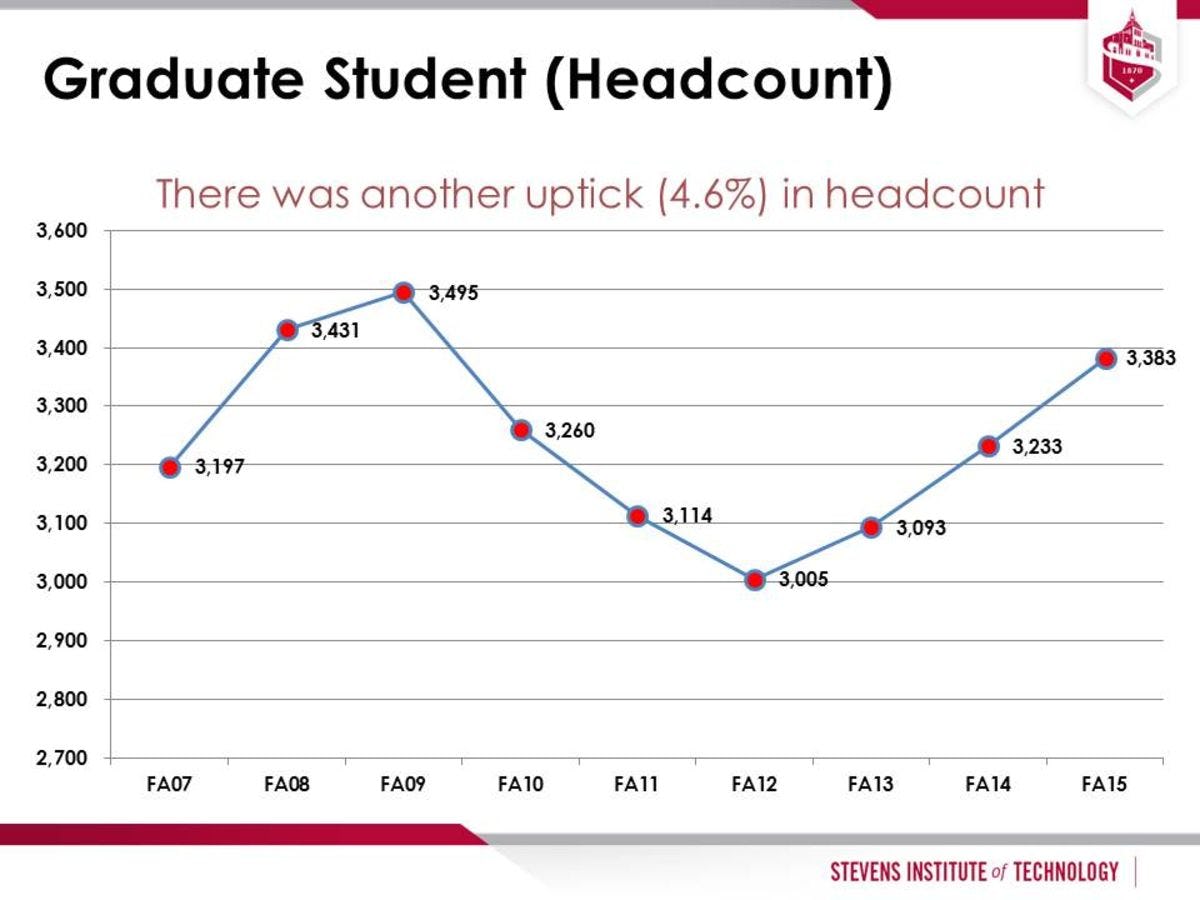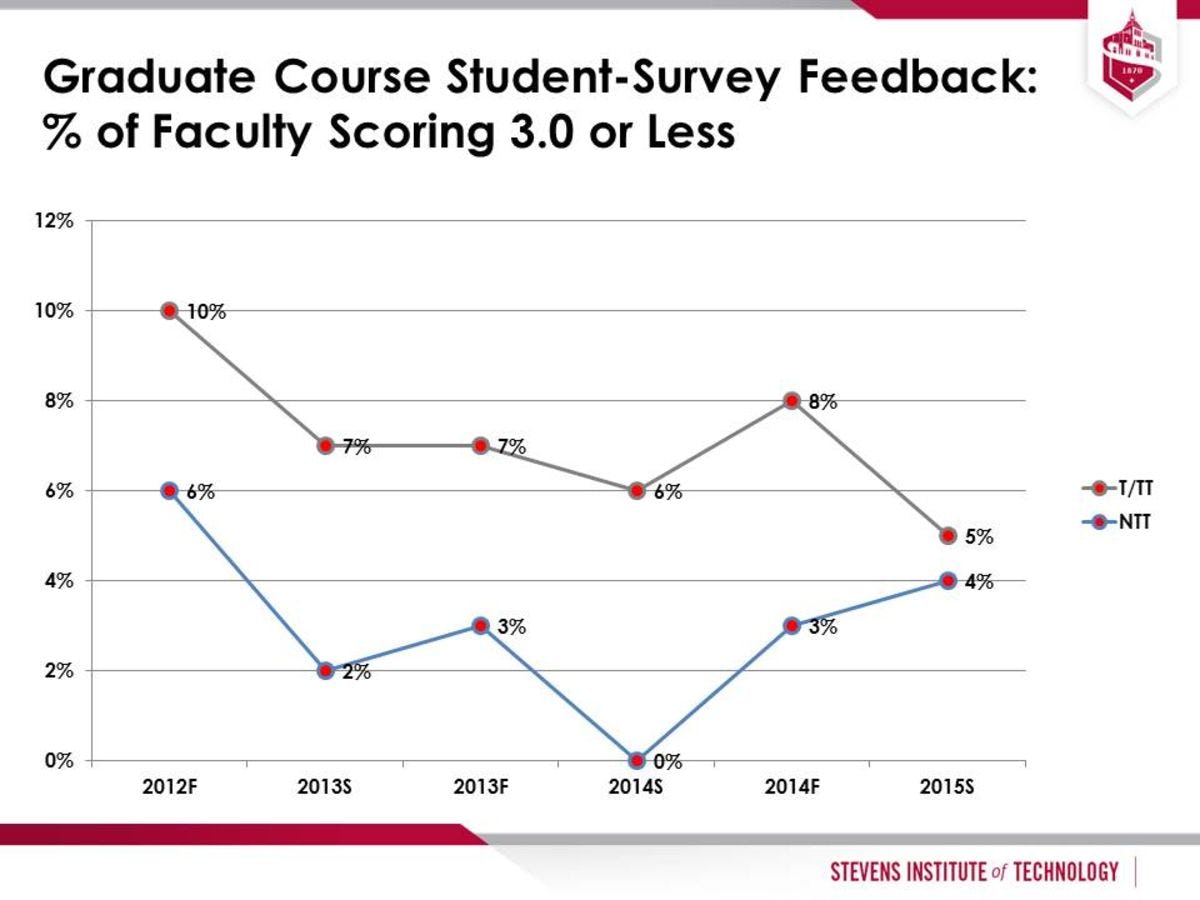Graduate student applications increased by 12 percent, and full-time graduate enrollment increased by 6.4 percent in Fall 2015. Selectivity continues to improve and a graduate enrollment diversification strategy has had early impact in attracting more graduate students from a broader set of countries.
Goal G1
Enhance the selectivity of our graduate admissions by admitting 45 percent of applicants by 2017 and 35 percent by 2022 from a baseline of 60 percent in 2011. Simultaneously increase the size of the full-time Ph.D. and master’s student population by at least 30 percent by 2022 from the Fall 2011 baseline of 1,248.
OWNER: PROVOST GEORGE KORFIATIS
The number of graduate applications increased 12 percent over Fall 2014 (5,810 in Fall 2015 vs. 5,187 in Fall 2014). Selectivity increased 4.3 percent, from 64.1 percent of graduate applicants accepted in Fall 2014 to 59.79 percent in Fall 2015. The cohort of new graduate students for Fall 2015 declined slightly, from Fall 2014 (1,236) to 1,210 in new graduate students in Fall 2015. Full-time graduate enrollment increased 6.4 percent over the prior year, from 2,008 to 2,137, and part-time graduate enrollment increased 1.7 percent, from 1,225 to 1,246, with total graduate headcount at 3,383, up 4.6 percent over the prior year. The number of countries represented in the graduate student population increased from 33 to 40 year over year. The Provost’s Masters’ Fellowship award is starting to show some early impact.Year 4: Diversify the graduate student body by increasing countries of origin; maintain the existing ratios of FT Ph.D. and Master’s student populations, which has already exceeded the 2020 goal; and achieve a 37 percent yield for accepted students.
Goal G2
From a baseline of 36 (including three international), we will double the number of off-campus/corporate domestic and international graduate partnerships, with an emphasis on the domains of particular significance to Stevens.
OWNER: PROVOST GEORGE KORFIATIS
On September 25, 2015, the Center for Corporate and Professional Education (CCPE) was charged by Board of Trustees to develop a Corporate Education Business Plan. The proposed plan is currently under development and will be presented to Board in March 2016.
Year 4: The Corporate Education Business plan will be completed for review, approval, and execution.
Goal G3
Undertake specific initiatives to improve our graduate faculty teaching performance and student learning.
OWNER: PROVOST GEORGE KORFIATIS
A formal teaching assessment and feedback process was established. Faculty members who score 3.75 or greater receive congratulatory letters while those scoring below 3.0 receive remediation letters, including a request that they meet with their department head/program director/dean to develop an improvement plan. During the last academic year, 174 congratulatory and 17 remediation letters were issued. The Center for Faculty Advancement has developed remediation resources, which include training modules available online through the Faculty & Staff Professional Development Canvas course-shell.
Other resources for improving teaching now include: “Tip of the Week” (33 sent AY 14-15); faculty professional development modules (300 teaching and learning-related seminars available); syllabus guidelines and template; teaching circle (12 participants in first circle); writing groups (over 25 faculty and PhD participated in first event); teaching conference funding (6 funded from 19 requesters); and a new Stevens workshop series entitled, “Lessons in Learning” (45 participants in first workshop).
Year 4: Continue efforts launched in Year 3; measure the impact and refine activities based on data.
Goal G4
Develop and formalize mechanisms to ensure all graduate students, including part-time and off-campus students, have opportunities to engage with the Stevens community as part of their curricular studies, as well as through extra-curricular activities.
OWNER: PROVOST GEORGE KORFIATIS
Assessment of participation and impact began for the set of graduate student engagement initiatives which have been launched over the past three years. Initiatives assessed for participation and/or impact during AY 14/15 include the graduate student enrichment series (65 sessions, 900+ students participated); graduate conference funding (70 participants); enhanced orientation (highly rated in exit survey); airport pick-up (350 student pick-ups); temporary housing provided (550+ room nights provided); and a host of social engagement activities and events (2000+ participants).
New initiatives launched this past year include the Ph.D. Network, which was developed as result of a student survey which asked what support engagement activities they would most like); the addition of the Green Line student shuttle service offering convenience to commuting graduate students (with a daily ridership of approximately 350 students); and several new graduate student professional clubs, such as the Business Intelligence and Analytics and the Financial Engineering professional clubs. There are now 19 such clubs active and serving the graduate student body.
Year 4: Continue to monitor and evaluate for participation and impact, expand resources and participation.

